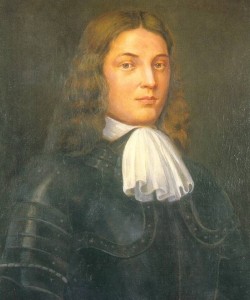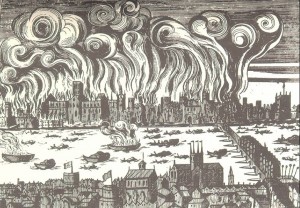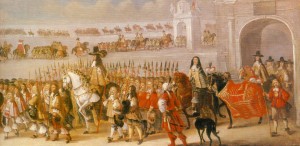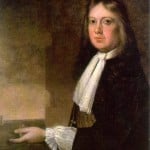Penn wrote No Cross, No Crown, rejecting the English class system and promoting a plain lifestyle.
Timeline Category: William Penn
1668
Penn wrote Sandy Foundation Shaken, questioning the doctrine of the trinity. Along with the printer of this pamphlet, he was jailed in the Tower of London and charged with blasphemy.
1666
Penn joined the radical religious group the Society of Friends.
A Life-Changing Decision
Lord Protector Oliver Cromwell is a controversial figure in English history, but one policy change we can applaud is his government’s tolerance of other Christian sects in England during their decade of rule. Apart from Catholics, the Commonwealth allowed people to openly promote other biblical interpretations. This included George Fox, a charismatic speaker and founder of a group later called Quakers. Penn’s decision to join Fox shocked his upper class family. Penn risked his social position, political connections, and financial prospects by choosing this path. Family friend Samuel Pepys wrote that Penn had “become a Quaker, or some such melancoly thing.” Under Charles II, dissenters were persecuted and jailed, but Penn would defend his faith with all his talent and energy for the rest of his life.
1666
1665
Penn studied law at one of London’s Inns of Court, Lincoln’s Inn. But he left almost immediately to go to sea and observe his father’s naval command for three weeks.
Devastating Disasters
During the 1660s, a number of devastating events left an impact on Penn, who was only in his 20s. In 1665, the Great Plague spread through London and killed 68,596 people. A year later, the Great Fire of London burned its way through 373 of 450 acres located within city walls, which included over 13,000 homes. In 1667 the Dutch then sailed up the Thames and set another fire, which burned through the English shipping industry. These disasters influenced the way Penn laid out the City of Philadelphia. For example, he planned for his “country towne” buildings to be made of brick and separated by plenty of open space to prevent fires.
1660
1653

Oliver Cromwell soon closed Parliament and became Lord Protector of England. Due to the political climate, Admiral Penn moved his family to their estates at Macroom Castle, Ireland.
The English Civil War
Since King Henry VIII broke from the Catholic Church and formed the Church of England, the English people had been embroiled in a conflict over religion. The break with Rome had opened a floodgate of religious arguments which would lead to new protestant sects and a struggle for power. At this time, there was NO separation between church and state, which meant that the church in charge would have far-reaching influence over the entire country. After over a century of struggling, it came down to the supporters of Charles I and his Church of England against th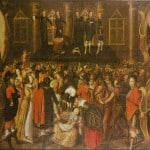
Penn heard his first Quaker preacher, Thomas Lee.

